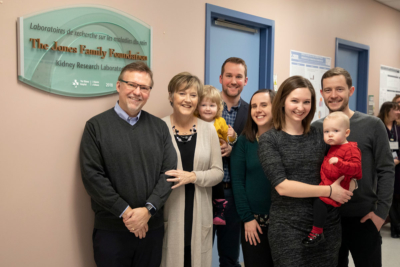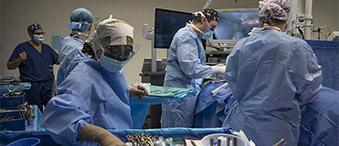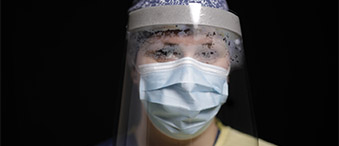Originally published: July, 2019
Updated: August, 2022
Update: Recently, June had to go back on hemodialysis after complications of being on peritoneal dialysis for eight years. As she awaits another kidney donor, June continues to watch her family grow. She now has four grandchildren, two girls and two boys. In August 2022, we were thrilled to announce a $10-million gift from the Jones family to the Campaign to Create Tomorrow. Read more about their incredible gift.
June Jones lives a double life. During the day, she is busy, making cookies with her two granddaughters, working in her garden, and enjoying life. During the night, she sleeps hooked up to a dialysis machine. June needs a new kidney.

The 58-year-old has been living with kidney disease for 30 years — over half her life.
In April 1989, not long after her second child was born, June felt extremely run down. Her physician was concerned she had too much blood in her urine and sent her to a nephrologist.
He diagnosed her with IgA nephropathy, disease caused by her body’s immune system attacking her kidneys.
June started on various medications after being diagnosed, but within nine years her disease had progressed, and her kidneys stopped working completely. She started dialysis in 1998.
“There is no cure for renal disease,” said June. “Once your kidneys fail, you’re put on dialysis or have a transplant. Your life is never normal.”
What kidneys do
The function of the kidneys is to remove waste and extra water from the blood to make urine. When kidneys stop working and no longer clean the blood, toxins accumulate in the body, and this can be fatal. Dialysis is an artificial method of cleaning the blood. It sustains a person’s life but is not a cure.
There are two different forms of dialysis. Hemodialysis removes waste products and extra water from the blood by circulating and filtering it through a machine. This is the most common form of dialysis that is often provided to patients at the hospital. Peritoneal dialysis circulates a fluid through the lining of your abdomen, or peritoneum, and the waste products from the blood pass into this fluid.
There are almost 1,000 patients on dialysis in the Ottawa area. Just over two hundred are on peritoneal dialysis. Dr. Brendan McCormick, Medical Director of the Home Dialysis Program, said some patients have been treated for over a decade on peritoneal dialysis but more typically patients spend about three years on this therapy. People leave peritoneal dialysis once they receive a kidney transplant, however, some need to transfer to hemodialysis due to complications of therapy.
The Ottawa Hospital Home dialysis program has the highest rate of kidney transplant in the province. For many patients, peritoneal dialysis serves as a bridge to kidney transplant.
Needing life-saving dialysis
According to a report by the Canadian Institute for Health Information released in December 2018, only 16 percent of Canadians on dialysis survive past 10 years. However, up to 74 percent of Canadians with a kidney transplant still have a functioning kidney after 10 years.
June was only on dialysis for six months before she received the call that a donor match had been found. On November 28, 1998, June received a kidney transplant from a deceased donor.
“It lasted four months shy of 15 years,” June said. “Then, the disease reappeared. I’ve been back on dialysis now for six years.”
In the Ottawa Region, 52 people have received kidney transplants this year. Unfortunately, there are still 165 people are on a waiting list.
“We need to do a lot of transplants to get people off dialysis to keep them alive longer with a better quality of life,” said Dr. Ann Bugeja, nephrologist and Director of the Living Kidney Donor Program. “We know that getting a living donor kidney is the best treatment for end-stage kidney disease and it lasts longer than getting a kidney from a deceased donor.”
When June’s kidney transplant failed six years ago, she had to go back on hemodialysis. She switched to peritoneal dialysis in July 2013. Once again, she has a dialysis machine at home, but this time she does dialysis for nine hours every night. It cleans her blood while she sleeps.
June’s nightly routine is a hassle and not a permanent solution. The membrane around her stomach has started to harden, which means the fluids can’t move back and forth as easily. What this means is that June will have to go on hemodialysis. The technology hasn’t changed in the 20 years since she was on it before and she remembers too vividly how it gave her severe headaches and was painful.
Making a difference for future generations

June needs a new kidney. She is on a Canada-wide waiting list for one.
“Giving a kidney can change somebody’s life,” said Dr. Bugeja.
June lives with the daily hope of a second transplant.
She and husband Russ know first-hand how important research is to improve outcomes for people suffering with kidney disease. They heard researchers at The Ottawa Hospital were making great strides finding solutions to kidney diseases, including detecting kidney disease early and looking at the potential of stem cells to heal injured kidneys.
They decided the only way to make a difference for future generations of patients was through research and made a $1 million donation to support kidney research at the Kidney Research Centre at The Ottawa Hospital.
Their support will enable the research team at the Kidney Research Centre to continue to advance knowledge and improve the care of patients with kidney disease through world-renowned studies and research.
June’s children are now adults, married, and parents themselves — each with their own adorable little girl.
On January 8, 2019, the entire family was at The Ottawa Hospital Kidney Research Centre to unveil a plaque outside the Jones Family Foundation Kidney Research Laboratory. The plaque commemorates their incredible support of kidney research.
“I hope with research advancements, I will live to see my grandchildren’s memorable events,” said June.
“I hope to be there for their high school graduations, university graduations, their wedding days, and when they have children of their own. I also hope great strides are made so that their generation will find a cure.”
Listen to Pulse podcast and hear June Jones in her own words explaining what it’s like waiting for a second kidney transplant and why research is so important.
The Ottawa Hospital is a leading academic health, research, and learning hospital proudly affiliated with the University of Ottawa.




